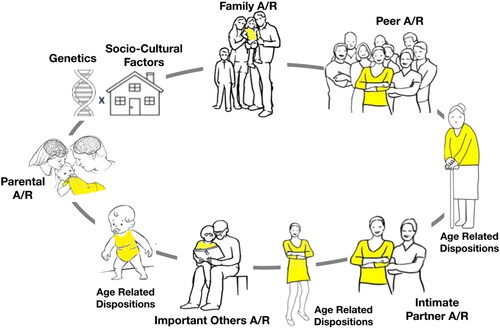Figures & data
Figure 1. Provide a graphic visualization of interpersonal acceptance-rejection theory (IPARTheory). The theory focuses on the biological predisposition for interpersonal social interactions across development. Effects of these positive and negative interactions (such as feeling accepted or rejected by parents, peers, and important others) that occur from birth and during childhood can extend into adulthood and old age – and thereby modulate one psychological adjustment as one ages. The quality of these interpersonal relationships can potentially impact one’s mental representations (conceptions of existence), which in turn influence one’s memory and perception of new interpersonal experiences (eg courting a potential partner or forming a family). Moreover, epigenetic mechanisms combined with sociocultural factors can also affect mental representations and biological processes in response to interpersonal experiences that occur during various life stages.

